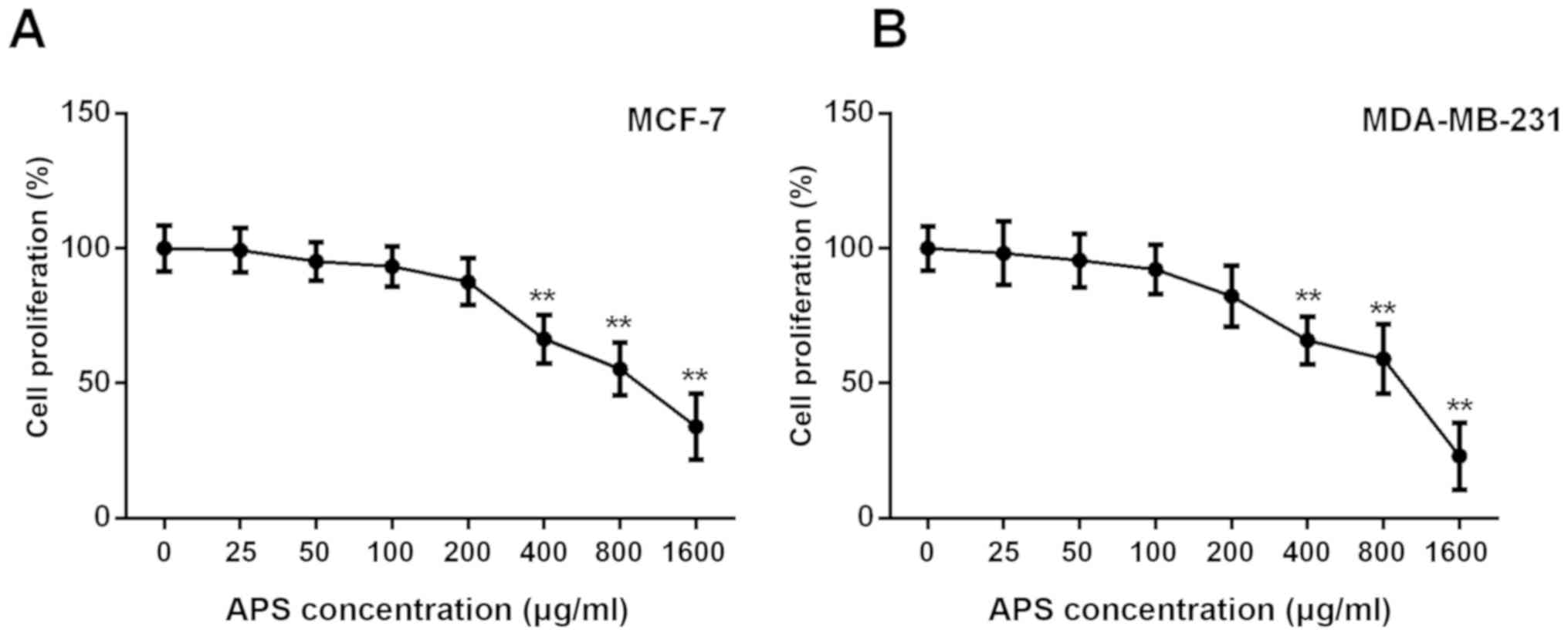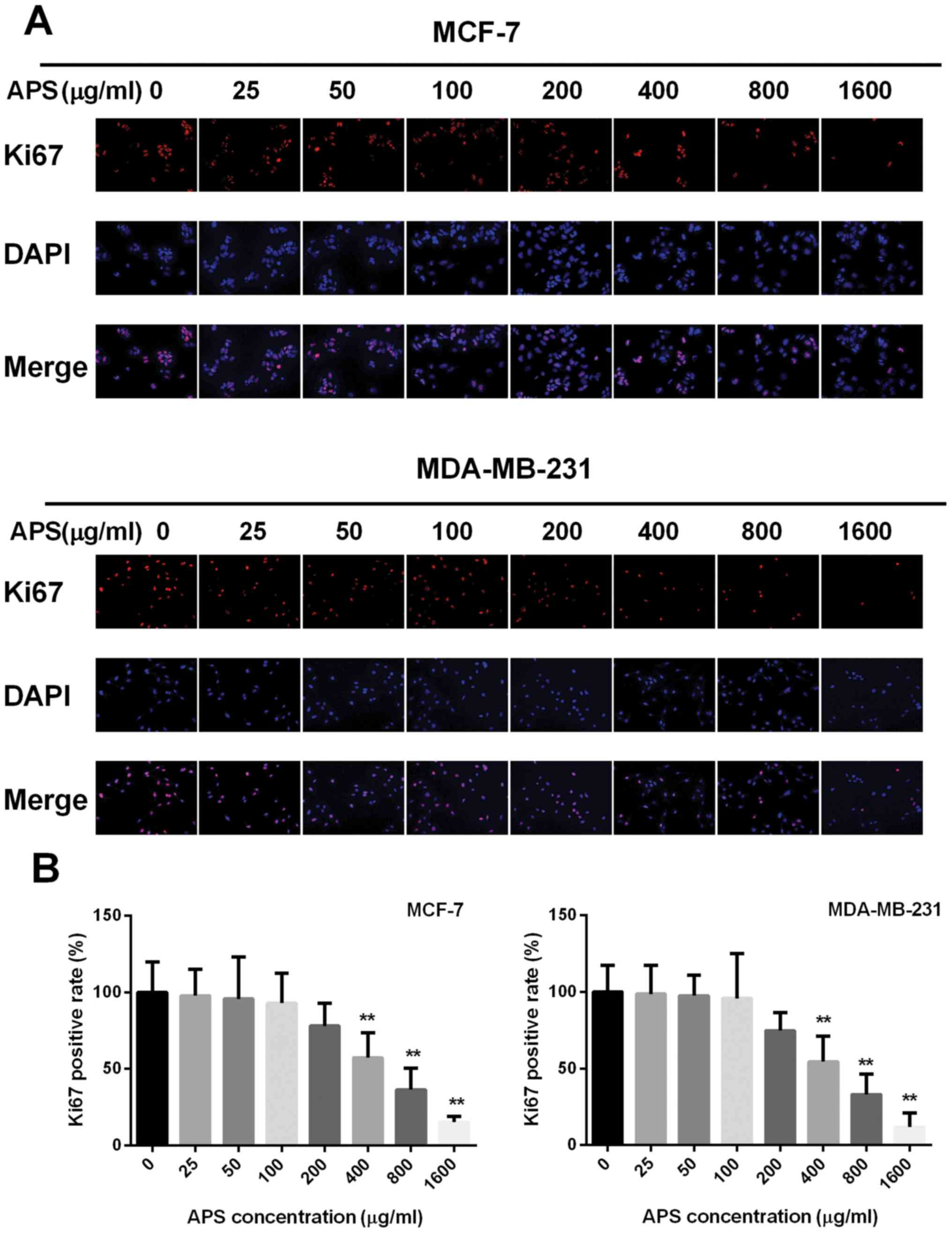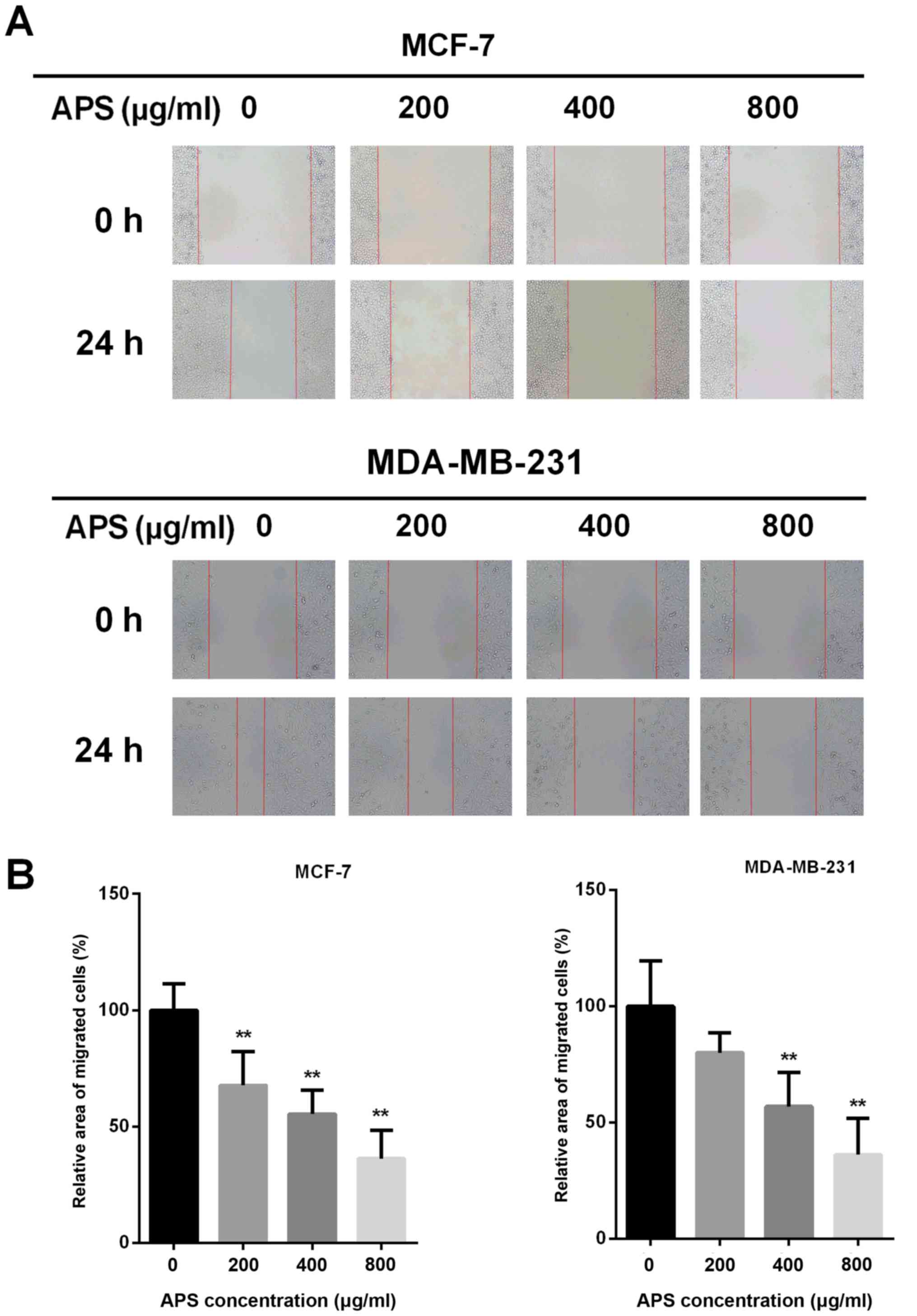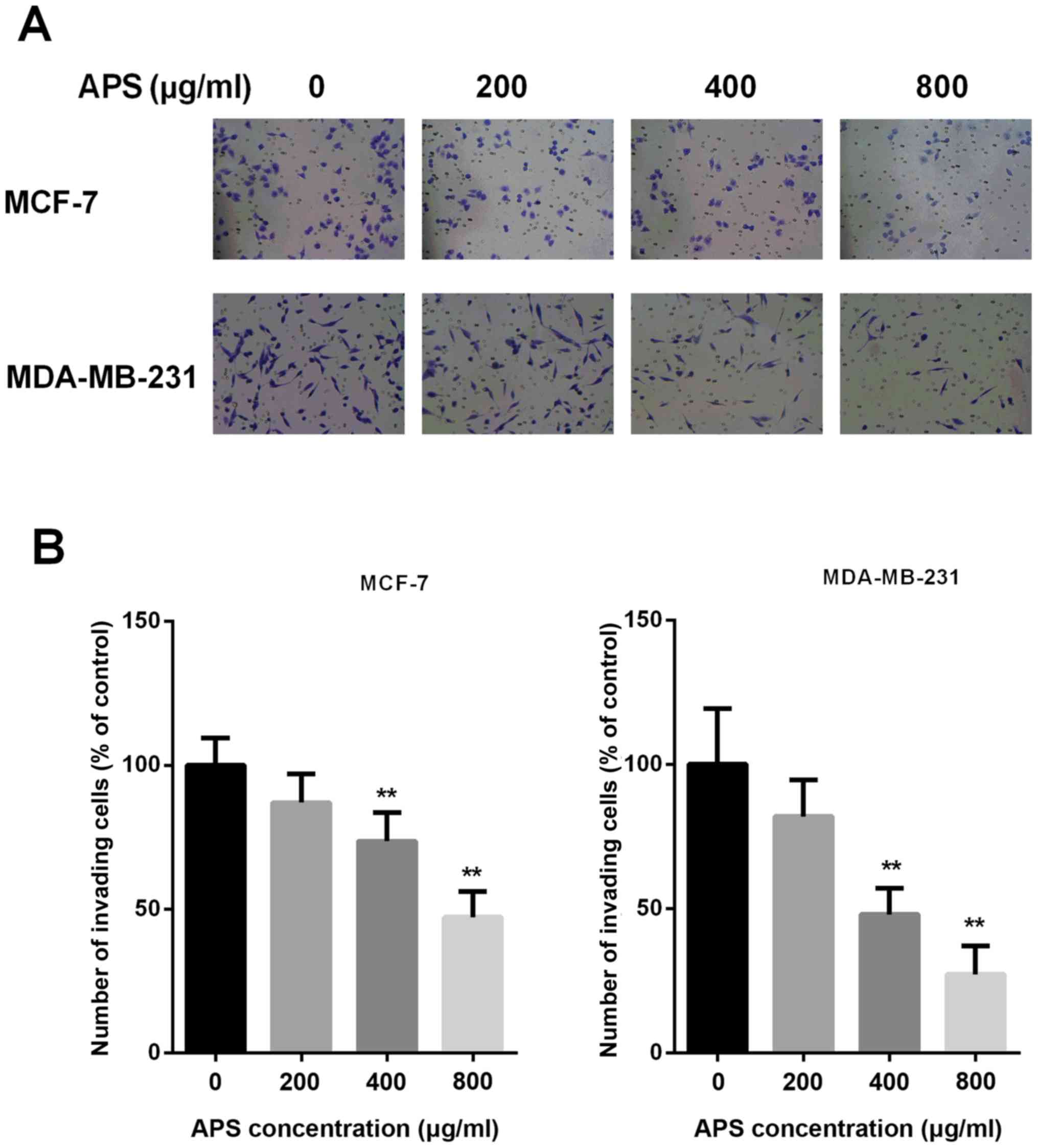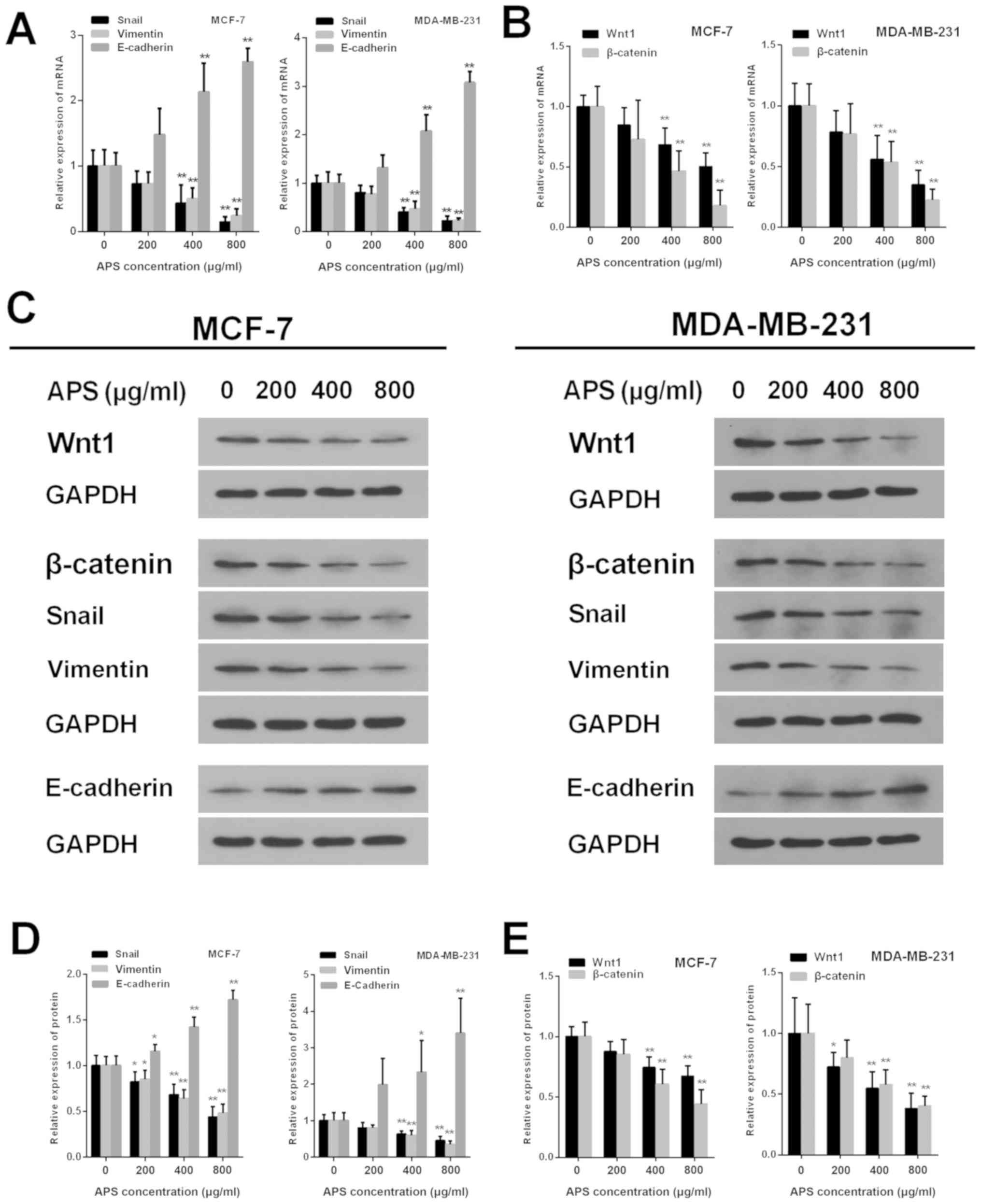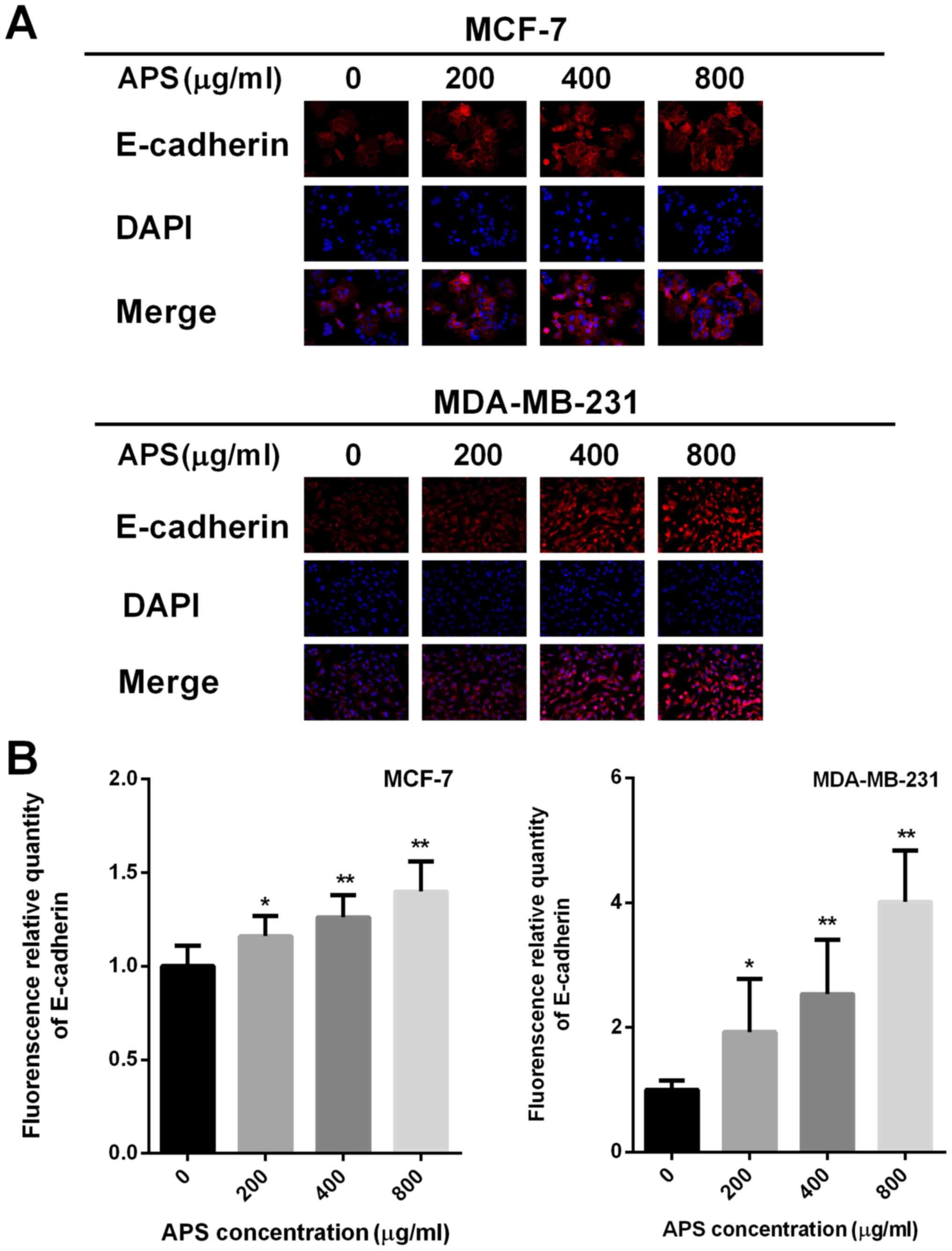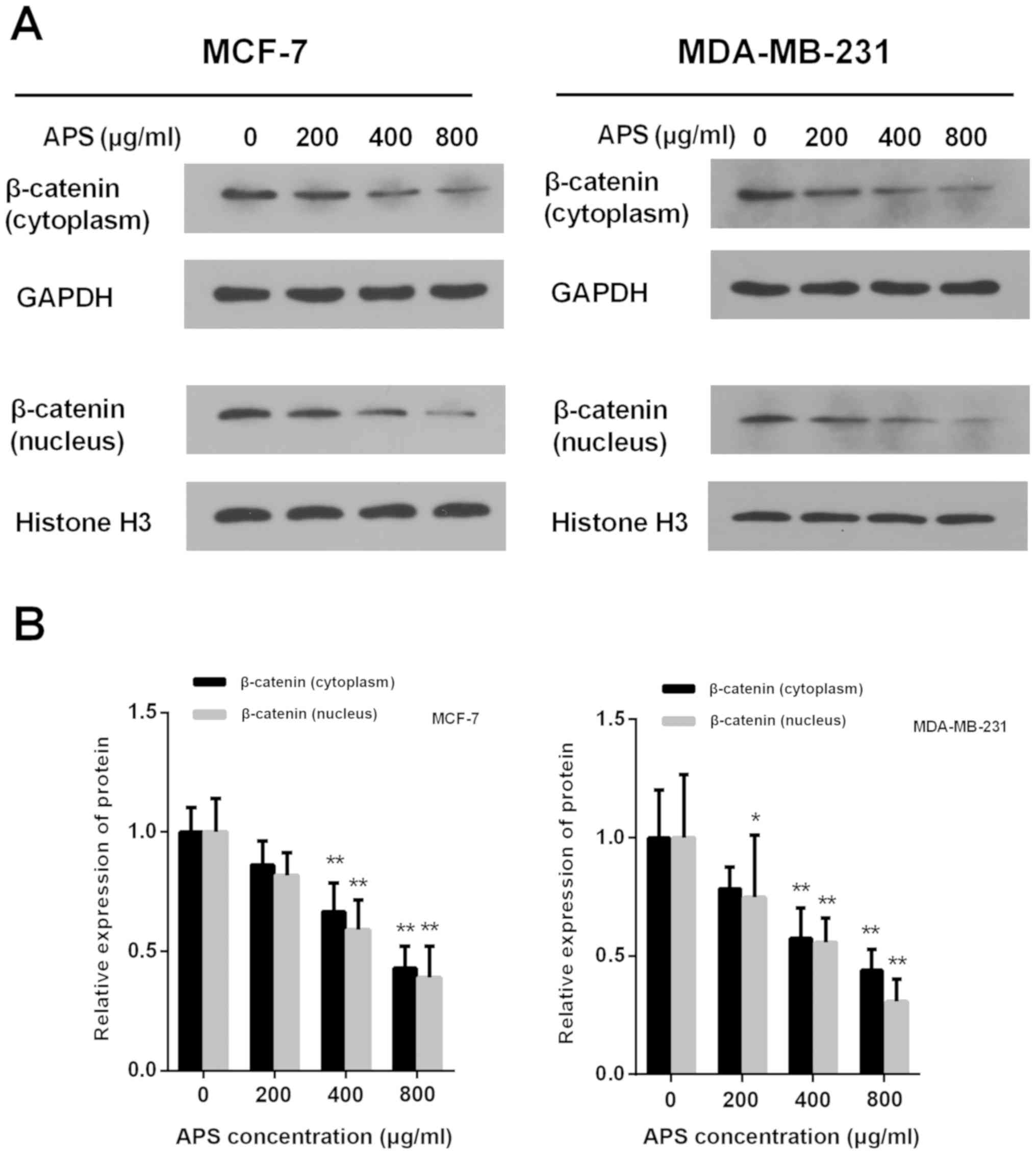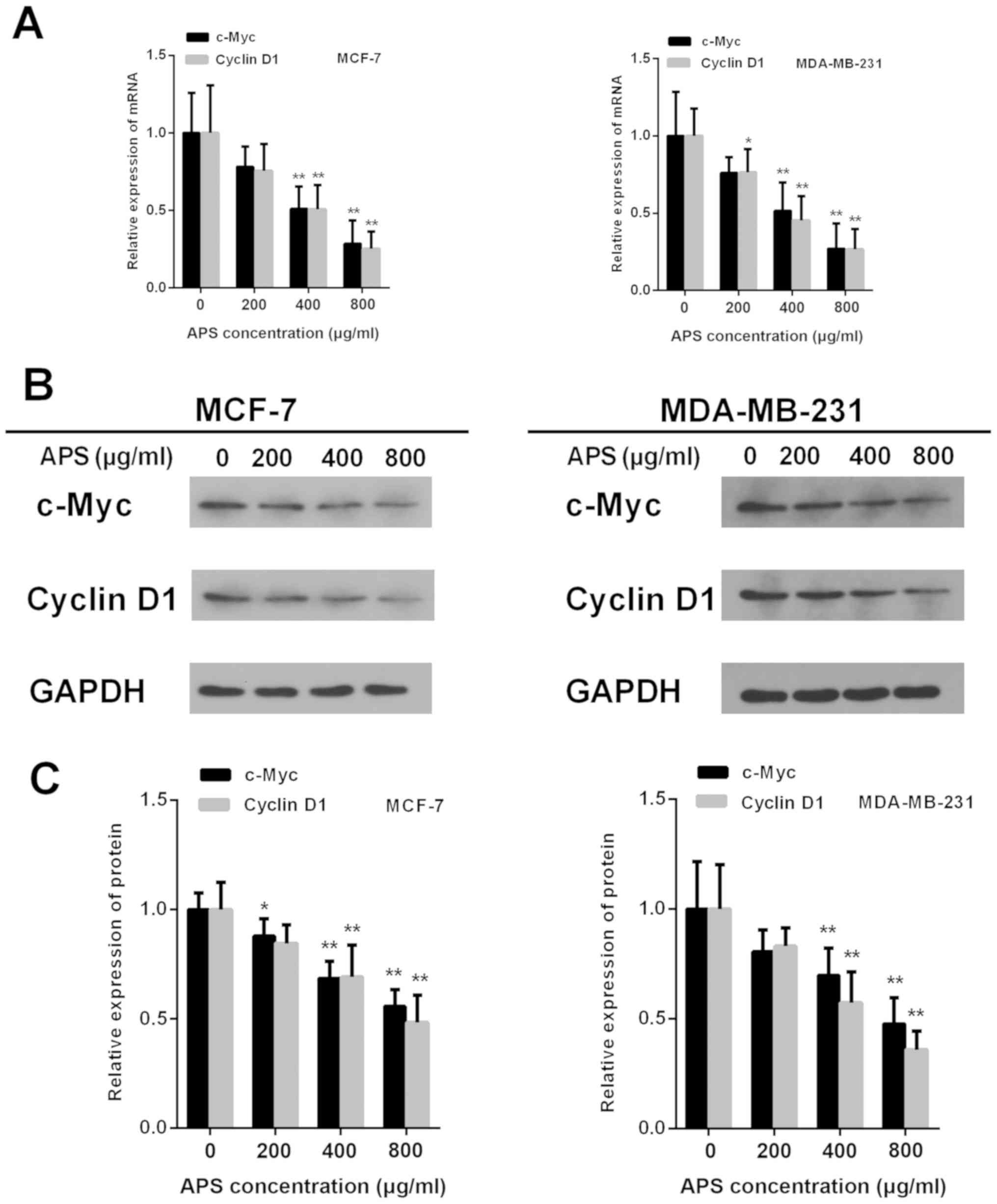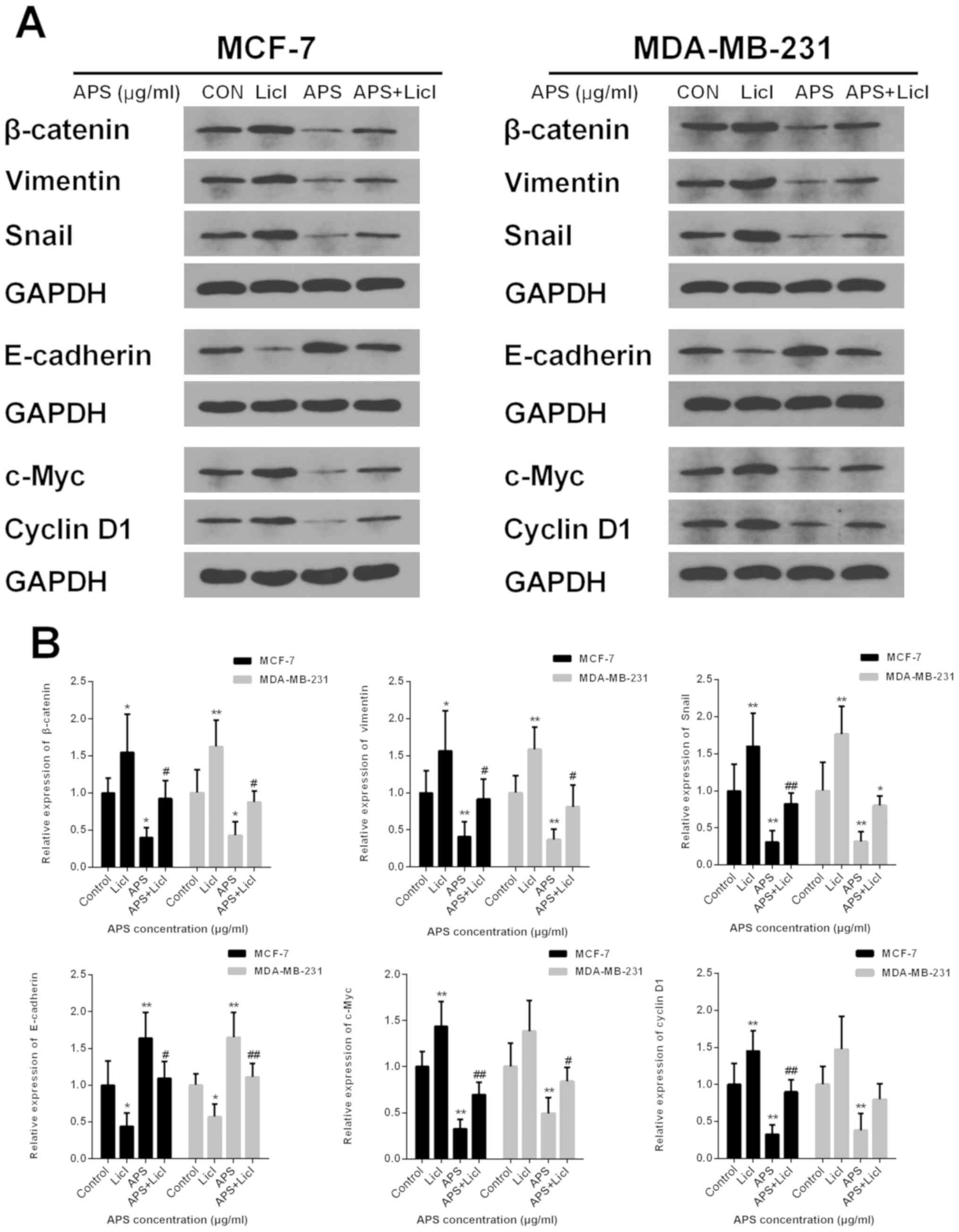|
1
|
Siegel RL, Miller KD and Jemal A: Cancer
statistics, 2017. CA Cancer J Clin. 67:7–30. 2017. View Article : Google Scholar : PubMed/NCBI
|
|
2
|
Tao Z, Shi A, Lu C, Song T, Zhang Z and
Zhao J: Breast cancer: Epidemiology and etiology. Cell Biochem
Biophys. 72:333–338. 2015. View Article : Google Scholar : PubMed/NCBI
|
|
3
|
Ferlay J, Soerjomataram I, Dikshit R, Eser
S, Mathers C, Rebelo M, Parkin DM, Forman D and Bray F: Cancer
incidence and mortality worldwide: Sources, methods and major
patterns in GLOBOCAN 2012. Int J Cancer. 136:E359–E386. 2015.
View Article : Google Scholar : PubMed/NCBI
|
|
4
|
Sharma R: Breast cancer incidence,
mortality and mortality-to-incidence ratio (MIR) are associated
with human development, 1990–2016: Evidence from Global Burden of
Disease Study 2016. Breast Cancer. 26:428–445. 2019. View Article : Google Scholar : PubMed/NCBI
|
|
5
|
Bhat V, Allan AL and Raouf A: Role of the
microenvironment in regulating normal and cancer stem cell
activity: Implications for breast cancer progression and therapy
response. Cancers (Basel). 11(pii): E12402019. View Article : Google Scholar : PubMed/NCBI
|
|
6
|
Benson JR and Jatoi I: The global breast
cancer burden. Future Oncol. 8:697–702. 2012. View Article : Google Scholar : PubMed/NCBI
|
|
7
|
Weidle UH, Birzele F and Nopora A:
MicroRNAs as potential targets for therapeutic intervention with
metastasis of non-small cell lung cancer. Cancer Genomics
Proteomics. 16:99–119. 2019. View Article : Google Scholar : PubMed/NCBI
|
|
8
|
Yan L, Xu F and Dai CL: Relationship
between epithelial-to-mesenchymal transition and the inflammatory
microenvironment of hepatocellular carcinoma. J Exp Clin Cancer
Res. 37:2032018. View Article : Google Scholar : PubMed/NCBI
|
|
9
|
Medici D, Shore EM, Lounev VY, Kaplan FS,
Kalluri R and Olsen BR: Conversion of vascular endothelial cells
into multipotent stem-like cells. Nat Med. 16:1400–1406. 2010.
View Article : Google Scholar : PubMed/NCBI
|
|
10
|
Bai J, Kwok WC and Thiery JP: Traditional
Chinese medicine and regulatory roles on epithelial-mesenchymal
transitions. Chin Med. 14:342019. View Article : Google Scholar : PubMed/NCBI
|
|
11
|
Shang BQ, Li ML, Quan HY, Hou PF, Li ZW,
Chu SF, Zheng JN and Bai J: Functional roles of circular RNAs
during epithelial-to-mesenchymal transition. Mol Cancer.
18:1382019. View Article : Google Scholar : PubMed/NCBI
|
|
12
|
Sjoberg E, Meyrath M, Milde L, Herrera M,
Lovrot J, Hagerstrand D, Frings O, Bartish M, Rolny C, Sonnhammer
E, et al: A novel ACKR2-dependent role of fibroblast-derived CXCL14
in Epithelial-to-mesenchymal transition and metastasis of breast
cancer. Clin Cancer Res. 25:3702–3717. 2019. View Article : Google Scholar : PubMed/NCBI
|
|
13
|
McCormack N and O'Dea S: Regulation of
epithelial to mesenchymal transition by bone morphogenetic
proteins. Cell Signal. 25:2856–2862. 2013. View Article : Google Scholar : PubMed/NCBI
|
|
14
|
Farahmand L, Darvishi B, Majidzadeh AK and
Madjid Ansari A: Naturally occurring compounds acting as potent
anti-metastatic agents and their suppressing effects on Hedgehog
and WNT/β-catenin singaling pathways. Cell Prolif. 502017.doi:
10.1111/cpr.12299.
|
|
15
|
Heldin CH, Vanlandewijck M and Moustakas
A: Regulation of EMT by TGFβ in cancer. FEBS Lett. 586:1959–1970.
2012. View Article : Google Scholar : PubMed/NCBI
|
|
16
|
Espinoza I and Miele L: Deadly crosstalk:
Notch signaling at the intersection of EMT and cancer stem cells.
Cancer Lett. 341:41–45. 2013. View Article : Google Scholar : PubMed/NCBI
|
|
17
|
Wang P, Gao XY, Yang SQ, Sun ZX, Dian LL,
Qasim M, Phyo AT, Liang ZS and Sun YF: Jatrorrhizine inhibits
colorectal carcinoma proliferation and metastasis through
Wnt/β-catenin signaling pathway and epithelial-mesenchymal
transition. Drug Des Devel Ther. 13:2235–2247. 2019. View Article : Google Scholar : PubMed/NCBI
|
|
18
|
Ram Makena M, Gatla H, Verlekar D,
Sukhavasi S, K Pandey M and C Pramanik K: Wnt/β-catenin signaling:
The culprit in pancreatic carcinogenesis and therapeutic
resistance. Int J Mol Sci. 20(pii): E42422019. View Article : Google Scholar : PubMed/NCBI
|
|
19
|
Wang W, Li Q, Yang T, Li D, Ding F, Sun H
and Bai G: Anti-cancer effect of Aquaporin 5 silencing in
colorectal cancer cells in association with inhibition of
Wnt/β-catenin pathway. Cytotechnology. 70:615–624. 2018. View Article : Google Scholar : PubMed/NCBI
|
|
20
|
Logan CY and Nusse R: The Wnt signaling
pathway in development and disease. Annu Rev Cell Dev Biol.
20:781–810. 2004. View Article : Google Scholar : PubMed/NCBI
|
|
21
|
Liu XL, Meng J, Zhang XT, Liang XH, Zhang
F, Zhao GR and Zhang T: ING5 inhibits lung cancer invasion and
epithelial-mesenchymal transition by inhibiting the WNT/β-catenin
pathway. Thorac Cancer. 10:848–855. 2019. View Article : Google Scholar : PubMed/NCBI
|
|
22
|
Okura T, Ohkawara B, Takegami Y, Ito M,
Masuda A, Seki T, Ishiguro N and Ohno K: Mianserin suppresses
R-spondin 2-induced activation of Wnt/β-catenin signaling in
chondrocytes and prevents cartilage degradation in a rat model of
osteoarthritis. Sci Rep. 9:28082019. View Article : Google Scholar : PubMed/NCBI
|
|
23
|
Brunt L and Scholpp S: The function of
endocytosis in Wnt signaling. Cell Mol Life Sci. 75:785–795. 2018.
View Article : Google Scholar : PubMed/NCBI
|
|
24
|
Krishnamurthy N and Kurzrock R: Targeting
the Wnt/beta-catenin pathway in cancer: Update on effectors and
inhibitors. Cancer Treat Rev. 62:50–60. 2018. View Article : Google Scholar : PubMed/NCBI
|
|
25
|
Khramtsov AI, Khramtsova GF, Tretiakova M,
Huo D, Olopade OI and Goss KH: Wnt/beta-catenin pathway activation
is enriched in basal-like breast cancers and predicts poor outcome.
Am J Pathol. 176:2911–2920. 2010. View Article : Google Scholar : PubMed/NCBI
|
|
26
|
Lin CH, Ji T, Chen CF and Hoang BH: Wnt
signaling in osteosarcoma. Adv Exp Med Biol. 804:33–45. 2014.
View Article : Google Scholar : PubMed/NCBI
|
|
27
|
Bamodu OA, Kuo KT, Wang CH, Huang WC, Wu
ATH, Tsai JT, Lee KY, Yeh CT and Wang LS: Astragalus
polysaccharides (PG2) Enhances the M1 polarization of
macrophages, functional maturation of dendritic cells, and T
cell-mediated anticancer immune responses in patients with lung
cancer. Nutrients. 11(pii): E22642019. View Article : Google Scholar : PubMed/NCBI
|
|
28
|
Jin M, Zhao K, Huang Q and Shang P:
Structural features and biological activities of the
polysaccharides from Astragalus membranaceus. Int J Biol
Macromol. 64:257–266. 2014. View Article : Google Scholar : PubMed/NCBI
|
|
29
|
Xie JH, Jin ML, Morris GA, Zha XQ, Chen
HQ, Yi Y, Li JE, Wang ZJ, Gao J, Nie SP, et al: Advances on
bioactive polysaccharides from medicinal plants. Crit Rev Food Sci
Nutr. 56 (Suppl 1):S60–S84. 2016. View Article : Google Scholar : PubMed/NCBI
|
|
30
|
Li W, Hu X, Wang S, Wang H, Parungao R,
Wang Y, Liu T and Song K: Detection and evaluation of Anti-cancer
efficiency of astragalus polysaccharide via a tissue engineered
tumor model. Macromol Biosci. 18:e18002232018. View Article : Google Scholar : PubMed/NCBI
|
|
31
|
Lai X, Xia W, Wei J and Ding X:
Therapeutic effect of Astragalus polysaccharides on hepatocellular
carcinoma H22-bearing mice. Dose Response. 15:15593258166851822017.
View Article : Google Scholar : PubMed/NCBI
|
|
32
|
Li C, Hong L, Liu C, Min J, Hu M and Guo
W: Astragalus polysaccharides increase the sensitivity of SKOV3
cells to cisplatin. Arch Gynecol Obstet. 297:381–386. 2018.
View Article : Google Scholar : PubMed/NCBI
|
|
33
|
Zhou X, Liu Z, Long T, Zhou L and Bao Y:
Immunomodulatory effects of herbal formula of astragalus
polysaccharide (APS) and polysaccharopeptide (PSP) in mice with
lung cancer. Int J Biol Macromol. 106:596–601. 2018. View Article : Google Scholar : PubMed/NCBI
|
|
34
|
Li W, Song K, Wang S, Zhang C, Zhuang M,
Wang Y and Liu T: Anti-tumor potential of astragalus
polysaccharides on breast cancer cell line mediated by macrophage
activation. Mater Sci Eng C Mater Biol Appl. 98:685–695. 2019.
View Article : Google Scholar : PubMed/NCBI
|
|
35
|
Zhang JX, Han YP, Bai C and Li Q: Notch1/3
and p53/p21 are a potential therapeutic target for APS-induced
apoptosis in non-small cell lung carcinoma cell lines. Int J Clin
Exp Med. 8:12539–12547. 2015.PubMed/NCBI
|
|
36
|
Livak KJ and Schmittgen TD: Analysis of
relative gene expression data using real-time quantitative PCR and
the 2(-Delta Delta C(T)) method. Methods. 25:402–408. 2001.
View Article : Google Scholar : PubMed/NCBI
|
|
37
|
Yang XG, Zhu LC, Wang YJ, Li YY and Wang
D: Current advance of therapeutic agents in clinical trials
potentially targeting tumor plasticity. Front Oncol. 9:8872019.
View Article : Google Scholar : PubMed/NCBI
|
|
38
|
Liu Y, Hua W, Li Y, Xian X, Zhao Z, Liu C,
Zou J, Li J, Fang X and Zhu Y: Berberine suppresses colon cancer
cell proliferation by inhibiting the SCAP/SREBP-1 signaling
pathway-mediated lipogenesis. Biochem Pharmacol. 174:1137762019.
View Article : Google Scholar : PubMed/NCBI
|
|
39
|
Song M, Wang X, Luo Y, Liu Z, Tan W, Ye P,
Fu Z, Lu F, Xiang W, Tang L, et al: Cantharidin suppresses gastric
cancer cell migration/invasion by inhibiting the PI3K/Akt signaling
pathway via CCAT1. Chem Biol Interact. 317:1089392020. View Article : Google Scholar : PubMed/NCBI
|
|
40
|
Chen T, Lin J, Tang D, Zhang M, Wen F, Xue
D and Zhang H: Paris saponin H suppresses human hepatocellular
carcinoma (HCC) by inactivation of Wnt/β-catenin pathway in vitro
and in vivo. Int J Clin Exp Pathol. 12:2875–2886. 2019.PubMed/NCBI
|
|
41
|
Shan H, Zheng X and Li M: The effects of
Astragalus membranaceus active extracts on autophagy-related
diseases. Int J Mol Sci. 20(pii): E19042019. View Article : Google Scholar : PubMed/NCBI
|
|
42
|
Sun S, Yang S, An N, Wang G, Xu Q, Liu J
and Mao Y: Astragalus polysaccharides inhibits cardiomyocyte
apoptosis during diabetic cardiomyopathy via the endoplasmic
reticulum stress pathway. J Ethnopharmacol. 238:1118572019.
View Article : Google Scholar : PubMed/NCBI
|
|
43
|
Zhao M, Zhang ZF, Ding Y, Wang JB and Li
Y: Astragalus polysaccharide improves palmitate-induced insulin
resistance by inhibiting PTP1B and NF-κB in C2C12 myotubes.
Molecules. 17:7083–7092. 2012. View Article : Google Scholar : PubMed/NCBI
|
|
44
|
Zhou L, Liu Z, Wang Z, Yu S, Long T, Zhou
X and Bao Y: Astragalus polysaccharides exerts immunomodulatory
effects via TLR4-mediated MyD88-dependent signaling pathway in
vitro and in vivo. Sci Rep. 7:448222017. View Article : Google Scholar : PubMed/NCBI
|
|
45
|
Karamanou K, Franchi M, Vynios D and
Brezillon S: Epithelial-to-mesenchymal transition and invadopodia
markers in breast cancer: Lumican a key regulator. Semin Cancer
Biol. Aug 8–2019.(Epub ahead of print). doi:
10.1016/j.semcancer.2019.08.003. View Article : Google Scholar : PubMed/NCBI
|
|
46
|
Song C, Sun P, He Q, Liu LL, Cui J and Sun
LM: Long non-coding RNA LINC01287 promotes breast cancer cells
proliferation and metastasis by activating Wnt/β-catenin signaling.
Eur Rev Med Pharmacol Sci. 23:4234–4242. 2019.PubMed/NCBI
|
|
47
|
Zhang Y, Fang J, Zhao H, Yu Y, Cao X and
Zhang B: Downregulation of microRNA-1469 promotes the development
of breast cancer via targeting HOXA1 and activating PTEN/PI3K/AKT
and Wnt/β-catenin pathways. J Cell Biochem. 120:5097–5107. 2019.
View Article : Google Scholar : PubMed/NCBI
|
|
48
|
Ma Y, Yan F, Wei W, Deng J, Li L, Liu L
and Sun J: Litchi seed aqueous extracts play a role in suppression
of epithelial-mesenchymal transition, invasion and migration in
breast cancer cells. Cell Cycle. 1–9. 2020.doi:
10.1080/15384101.2019.1710912 (Epub ahead of print).
|
|
49
|
Duan X, Guo G, Pei X, Wang X, Li L, Xiong
Y and Qiu X: Baicalin inhibits cell viability, migration and
invasion in breast cancer by regulating miR-338-3p and MORC4. Onco
Targets Ther. 12:11183–11193. 2019. View Article : Google Scholar : PubMed/NCBI
|
|
50
|
Wei T, Xiaojun X and Peilong C:
Magnoflorine improves sensitivity to doxorubicin (DOX) of breast
cancer cells via inducing apoptosis and autophagy through AKT/mTOR
and p38 signaling pathways. Biomed Pharmacother. 121:1091392020.
View Article : Google Scholar : PubMed/NCBI
|
|
51
|
Yang B, Xiao B and Sun T: Antitumor and
immunomodulatory activity of Astragalus membranaceus
polysaccharides in H22 tumor-bearing mice. Int J Biol Macromol.
62:287–290. 2013. View Article : Google Scholar : PubMed/NCBI
|
|
52
|
Venning FA, Wullkopf L and Erler JT:
Targeting ECM disrupts cancer progression. Front Oncol. 5:2242015.
View Article : Google Scholar : PubMed/NCBI
|
|
53
|
Tsubakihara Y and Moustakas A:
Epithelial-mesenchymal transition and metastasis under the control
of transforming growth factor β. Int J Mol Sci. 19(pii): E36722018.
View Article : Google Scholar : PubMed/NCBI
|
|
54
|
Vijay GV, Zhao N, Den Hollander P, Toneff
MJ, Joseph R, Pietila M, Taube JH, Sarkar TR, Ramirez-Pena E,
Werden SJ, et al: GSK3β regulates epithelial-mesenchymal transition
and cancer stem cellproperties in triple-negative breast cancer.
Breast Cancer Res. 21:372019. View Article : Google Scholar : PubMed/NCBI
|
|
55
|
Wang Y and Zhou BP: Epithelial-mesenchymal
Transition-A Hallmark of breast cancer metastasis. Cancer Hallm.
1:38–49. 2013. View Article : Google Scholar : PubMed/NCBI
|
|
56
|
Fu Y, Zheng S, An N, Athanasopoulos T,
Popplewell L, Liang A, Li K, Hu C and Zhu Y: β-catenin as a
potential key target for tumor suppression. Int J Cancer.
129:1541–1551. 2011. View Article : Google Scholar : PubMed/NCBI
|
|
57
|
Valenta T, Hausmann G and Basler K: The
many faces and functions of β-catenin. EMBO J. 31:2714–2736. 2012.
View Article : Google Scholar : PubMed/NCBI
|
|
58
|
Rahmani F, Amerizadeh F, Hassanian SM,
Hashemzehi M, Nasiri SN, Fiuji H, Ferns GA, Khazaei M and Avan A:
PNU-74654 enhances the antiproliferative effects of 5-FU in breast
cancer and antagonizes thrombin-induced cell growth via the Wnt
pathway. J Cell Physiol. 234:14123–14132. 2019. View Article : Google Scholar : PubMed/NCBI
|
|
59
|
Hseu YC, Lin YC, Rajendran P, Thigarajan
V, Mathew DC, Lin KY, Way TD, Liao JW and Yang HL: Antrodia
salmonea suppresses invasion and metastasis in triple-negative
breast cancer cells by reversing EMT through the NF-κB and
Wnt/β-catenin signaling pathway. Food Chem Toxicol. 124:219–230.
2018. View Article : Google Scholar : PubMed/NCBI
|
|
60
|
Zhang K, Liu P, Tang H, Xie X, Kong Y,
Song C, Qiu X and Xiao X: AFAP1-AS1 promotes epithelial-mesenchymal
transition and tumorigenesis through Wnt/β-catenin signaling
pathway in Triple-negative breast cancer. Front Pharmacol.
9:12482018. View Article : Google Scholar : PubMed/NCBI
|
|
61
|
Jamieson C, Sharma M and Henderson BR: Wnt
signaling from membrane to nucleus: β-catenin caught in a loop. Int
J Biochem Cell Biol. 44:847–850. 2012. View Article : Google Scholar : PubMed/NCBI
|
|
62
|
Rao TP and Kuhl M: An updated overview on
Wnt signaling pathways: A prelude for more. Circ Res.
106:1798–1806. 2010. View Article : Google Scholar : PubMed/NCBI
|
|
63
|
Carayol N and Wang CY: IKKalpha stabilizes
cytosolic beta-catenin by inhibiting both canonical and
non-canonical degradation pathways. Cell Signal. 18:1941–1946.
2006. View Article : Google Scholar : PubMed/NCBI
|
|
64
|
De A: Wnt/Ca2+ signaling
pathway: A brief overview. Acta Biochim Biophys Sin (Shanghai).
43:745–756. 2011. View Article : Google Scholar : PubMed/NCBI
|
|
65
|
Wang Y: Wnt/Planar cell polarity
signaling: A new paradigm for cancer therapy. Mol Cancer Ther.
8:2103–2109. 2009. View Article : Google Scholar : PubMed/NCBI
|
|
66
|
Veeman MT, Axelrod JD and Moon RT: A
second canon. Functions and mechanisms of beta-catenin-independent
Wnt signaling. Dev Cell. 5:367–377. 2003. View Article : Google Scholar : PubMed/NCBI
|
|
67
|
Kang Y and Massague J:
Epithelial-mesenchymal transitions: Twist in development and
metastasis. Cell. 118:277–279. 2004. View Article : Google Scholar : PubMed/NCBI
|
|
68
|
Danielsson F, Peterson MK, Caldeira Araujo
H, Lautenschläger F and Gad AKB: Vimentin diversity in health and
disease. Cells. 7(pii): E1472018. View Article : Google Scholar : PubMed/NCBI
|
|
69
|
Tsuruta D and Jones JC: The vimentin
cytoskeleton regulates focal contact size and adhesion of
endothelial cells subjected to shear stress. J Cell Sci.
116:4977–4984. 2003. View Article : Google Scholar : PubMed/NCBI
|
|
70
|
Maskarinec G, Ju D, Fong J, Horio D, Chan
O, Loo LWM and Hernandez BY: Mammographic density and breast tissue
expression of inflammatory markers, growth factors and vimentin.
BMC Cancer. 18:11912018. View Article : Google Scholar : PubMed/NCBI
|
|
71
|
Hirohashi S: Inactivation of the
E-cadherin-mediated cell adhesion system in human cancers. Am J
Pathol. 153:333–339. 1998. View Article : Google Scholar : PubMed/NCBI
|
|
72
|
Aristizabal-Pachon AF and Takahashi CS:
Effect of genetics, epigenetics and variations in the
transcriptional expression of cadherin-E in breast cancer
susceptibility. Biomedica. 36:593–602. 2016.(In Spanish).
View Article : Google Scholar : PubMed/NCBI
|
|
73
|
Wang Q, Gun M and Hong XY: Induced
Tamoxifen resistance is mediated by increased methylation of
E-cadherin in estrogen receptor-expressing breast cancer cells. Sci
Rep. 9:141402019. View Article : Google Scholar : PubMed/NCBI
|
|
74
|
Miliani de Marval PL, Macias E, Rounbehler
R, Sicinski P, Kiyokawa H, Johnson DG, Conti CJ and
Rodriguez-Puebla ML: Lack of cyclin-dependent kinase 4 inhibits
c-myc tumorigenic activities in epithelial tissues. Mol Cell Biol.
24:7538–7547. 2004. View Article : Google Scholar : PubMed/NCBI
|
|
75
|
Bertoli C, Skotheim JM and de Bruin RA:
Control of cell cycle transcription during G1 and S phases. Nat Rev
Mol Cell Biol. 14:518–528. 2013. View Article : Google Scholar : PubMed/NCBI
|
|
76
|
Rubin SM: Deciphering the retinoblastoma
protein phosphorylation code. Trends Biochem Sci. 38:12–19. 2013.
View Article : Google Scholar : PubMed/NCBI
|















